
Choosing between MyHeritage and AncestryDNA for your genetic testing needs can be a tough decision. Both have unique strengths and cater to different user preferences.
MyHeritage is a popular choice because of its comprehensive, user-friendly experience. Known for its fast processing time, MyHeritage delivers results quicker than most of its competitors. MyHeritage is also the cheaper ancestry test.
On the other hand, AncestryDNA is widely recognized for its extensive database, the largest in the industry. This gives you a better chance of connecting with distant relatives. It also covers a broad range of ethnic groups, making it a top pick for those interested in a detailed exploration of their roots.
Both companies offer high-quality DNA testing services, but their individual strengths may sway your decision depending on your specific needs.
Ancestry DNA and MyHeritage DNA Deals Update 2023
Quick Comparison: MyHeritage DNA vs. AncestryDNA
| Feature | AncestryDNA | MyHeritage |
|---|---|---|
| ⚙ Types of DNA Tests | Ancestry DNA tests; Traits DNA test | Ancestry DNA test |
| 🤑 Pricing | Starts at $99 | Starts at $89 |
| 💉 Sample Collection | Cheek swab | Cheek swab |
| ⌛ Turnaround Time | Within 8 weeks | Within 4 weeks |
| 📚 Database Size | 19 billion DNA samples; 20 billion + historical records | 6.5 million DNA samples; 19 billion historical records |
| 🌍 Geographical Coverage | 1,800+ geographical regions | 42 ethnicities and 2,114 regions |
| ❓ Allows free raw DNA upload? | No | Yes |
| 💰 Free trial | Yes (14 days) | Yes (14 days, full access) |
| 📜 Subscription service | Yes (three tiers, starts at $24.99) | Yes (4 tiers, starts at $79) |
| ⭐ Review (Updated 2023) | AncestryDNA Full Review | MyHeritage DNA Full Review |
Types of DNA Kits Offered by Ancestry and MyHeritage
MyHeritage and AncestryDNA both offer autosomal DNA test kits, which analyze chromosomes inherited from both parents to provide a broad view of your ancestry. MyHeritage’s kit focuses on providing ethnic breakdowns and also offers features like DNA matching for finding relatives. In addition, MyHeritage allows you to upload DNA data from other testing services, giving you a different analysis perspective.
AncestryDNA also provides an autosomal DNA test kit, but its strength lies in its extensive database, which enhances its DNA-matching capabilities. Users are more likely to find distant relatives due to the sheer size of its database. AncestryDNA’s kit also provides a detailed ethnic breakdown, and it goes further by offering a historical and geographical context for your ancestral roots through its StoryScapes feature.
Both kits are relatively easy to use, requiring a saliva sample that you send back for analysis. The turnaround time for results varies, with MyHeritage generally being faster.
MyHeritage has only one DNA test kit available, which will cost you $89. You also have the option to get the same DNA test with a subscription at the same price. AncestryDNA, however, offers three DNA tests, though they’re generally similar. There’s the basic DNA test, a DNA test with its World Explorer subscription plan membership, and AncestryDNA + Traits (with All Access Membership). The last test will also analyze some of your traits, in addition to ancestry.
Subscription Plans
MyHeritage and AncestryDNA both offer subscription plans that go beyond basic DNA test results, primarily aimed at individuals interested in genealogy research and building detailed family trees.
MyHeritage offers several subscription tiers. The Data subscription provides users with access to a wealth of historical records and enhanced search capabilities. For those seeking a thorough exploration of DNA and ancestry, the Complete subscription merges DNA analysis with unrestricted access to historical records and sophisticated genealogy tools.
On the other hand, AncestryDNA’s subscription packages grant entry to Ancestry.com’s extensive archive of historical documents, including vital records like births, marriages, and deaths. The subscription levels differ, with the U.S. Discovery plan tailored to U.S. records, the World Explorer plan expanding the search to global records, and the All Access plan encompassing all features of the previous plans while adding exclusive access to Fold3 military records and Newspapers.com archives.
It’s important to note that both services offer free basic versions that allow for DNA matching and building a family tree, but the advanced features and historical records are behind a paywall.
Sample Collection and Turnaround Time
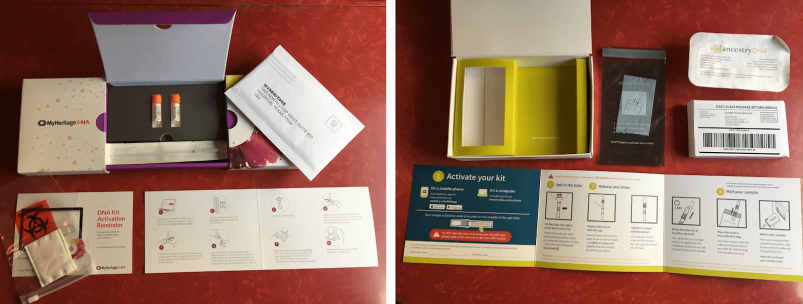
Both DNA testing kits contain everything you need to collect and send in your sample: instructions, sample collection tubes, and related paraphernalia, and return envelopes or boxes.
How to Get Your DNA Tested (Through Either Company)
- Register Online. After you buy your test kit, you’ll need to go online and create an account. In addition to your email address and other information, you’ll need to provide the unique code that’s printed on your test kit (either on the box or somewhere inside). This is so they can match your sample to your account.
- Supply Your Sample. You’ll need to wait at least 30 minutes after eating or drinking anything. Then, follow the instructions on your test kit for collecting your DNA and mailing it in.
- Wait for Results, Grow Your Tree. They’ll email you right away to let you know when they’ve received your sample. After that, it takes a few weeks for them to sequence your DNA, interpret their findings, and prepare a report for you.
While waiting for further updates, you have the option to begin constructing your family tree on their website or mobile app. If you haven’t already subscribed to their genealogy service, it’s worth considering as it significantly enhances your ability to build a comprehensive family tree. Without a subscription, your ability to build your family tree may be quite limited.
Once you provide the names, birth dates, and birthplaces of your closest relatives, these genealogy companies will suggest additional relatives for you to include based on matches found in their extensive genealogy databases. However, please note that you may not be able to add these suggested relatives unless you have an active subscription to the genealogy service.
- Receive Your Report. When your report is ready, the companies will notify you via email. To view your results, just log into their website or mobile app. Your report will spell out everything they’ve discovered about your ancestry and your likely relatives around the world.
Where the Process Differs
- Sample Collection Type. With AncestryDNA, you collect your DNA sample by spitting into a tube. It’s pretty quick and easy – just be careful not to overfill! There’s some liquid in the cap that’s intended to stabilize your DNA while it’s in transit. MyHeritage, on the other hand, asks you to rub a swab against the inside of each cheek for 30-60 seconds. It’s a little more trouble than a saliva sample, but it’s not that big of a deal.
- Postage. AncestryDNA has prepaid the postage for mailing in your sample. MyHeritage makes you pay for the return postage. This means an inconvenient trip to the post office, plus an added cost.
- Wait Time. MyHeritage promises you’ll get your results within three to four weeks of receiving your sample. AncestryDNA says it takes them more like four to six weeks to analyze your DNA and prepare your report. In my case, I got results from both companies in around two weeks. So there may not be as much of a difference as their websites would suggest.
- Volume of Emails. While you’re waiting for your report – as well as after you receive it – both companies will send you lots of emails saying they’ve found new likely relatives for you in their database.
If you have subscribed to their genealogy services, receiving emails from them is great news. You can simply click on the emails, review the matches they have discovered, and add them to your family tree.
However, if you haven’t subscribed, these emails can be quite frustrating. Without a subscription, you are unable to add these relatives to your tree, and you may also receive separate emails encouraging you to subscribe.
In the past two months, I have received 45 emails from MyHeritage, while AncestryDNA sent me 24 emails. Although I have the option to opt out of these emails, I have chosen to keep receiving them so I can provide you, dear reader, with insights into what you can expect.
In the following sections, I will outline the differences I experienced during the sample submission process and the wait for my report. Afterward, we will delve into the details of the reports themselves.
Test Results
When the big day comes and you find out your report is ready, you’ll run to your computer and eagerly log onto the testing company’s website (or pull out your phone to check their app). What will you see?
The ancestry reports from MyHeritage DNA and AncestryDNA contain many of the same elements. I’ll show you examples of my reports side by side so you can see how they compare. Then I’ll present some unique features from each.
Common Features
- Ethnicity Estimate. This feature tells you what percentage of your ancestors came from specific areas around the world.
Here’s my ethnicity estimate from MyHeritage DNA:
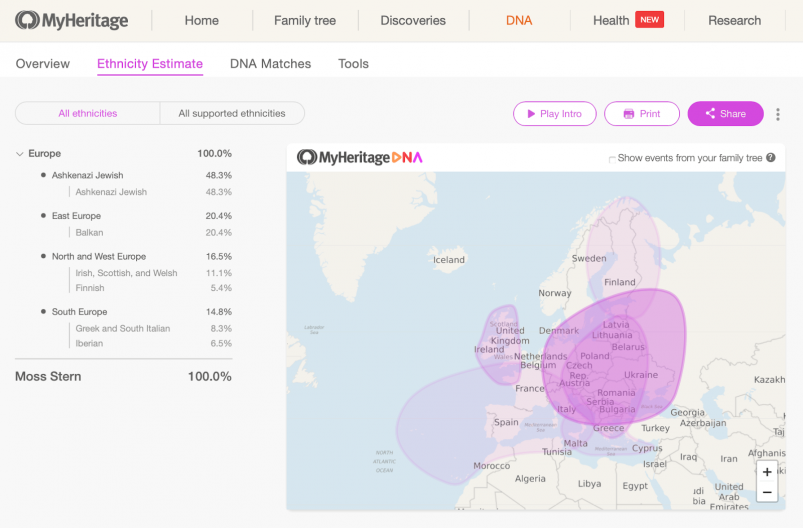
And here’s AncestryDNA’s version:
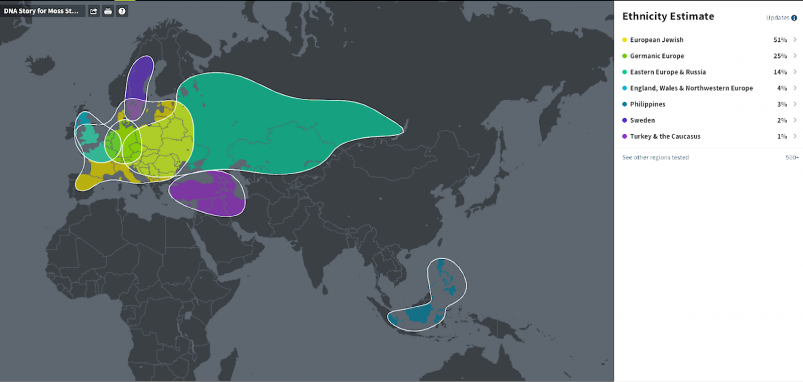
As you can see, both reports have color-coated blobs that represent the regions from which my forebears originated. There’s a lot of overlap between the two ethnicity estimates.
However, AncestryDNA picked up on my Southeast Asian ancestry, whereas MyHeritage DNA did not. That’s not to say that MyHeritage doesn’t look for such ancestry. They just didn’t find it for me.
For each ethnicity or region, both companies will give you a bit more context or historical/geographical detail.
MyHeritage DNA:
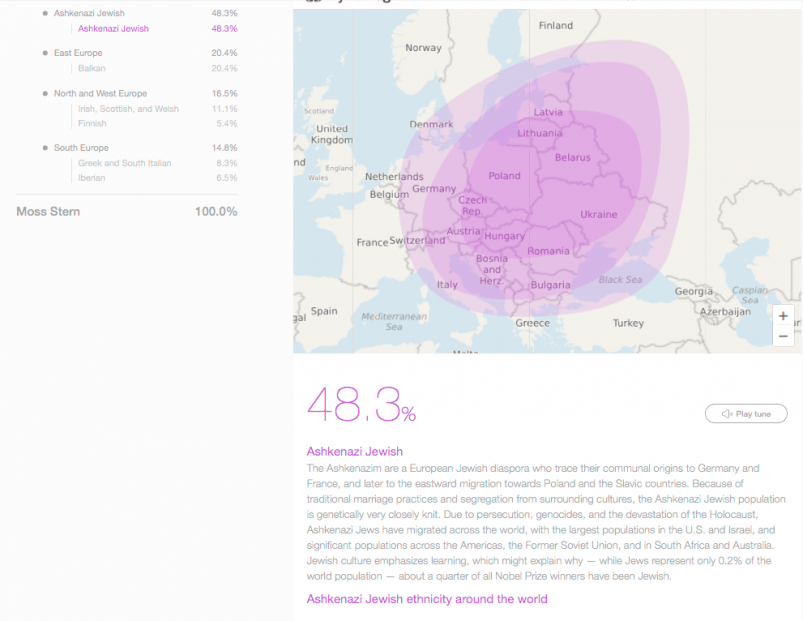
AncestryDNA:
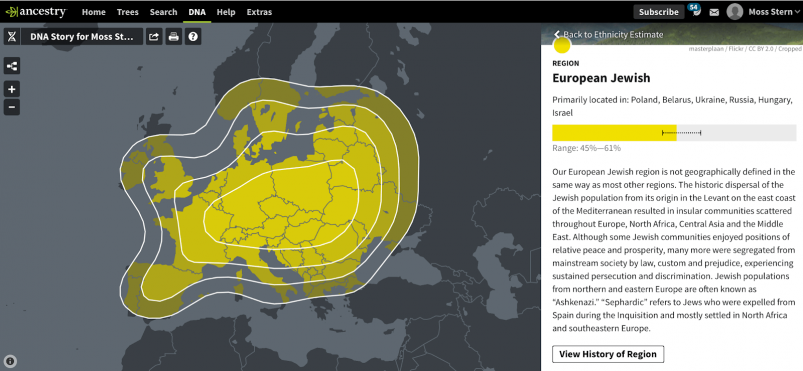
They’re very similar in terms of content. It’s just the presentation that’s different. Personally, I prefer MyHeritage DNA’s brightly colored maps to the dark and gloomy ones that AncestryDNA uses.
- DNA Matches. Both companies will give you a list of people who are likely to be your relatives, based on commonalities in your DNA. I’ll show how my lists compare. I’ve redacted my relatives’ names for their privacy.
MyHeritage DNA’s list for me includes more than 11,000 people. (I wonder, can I really have that many living relatives who have taken their DNA test?!)
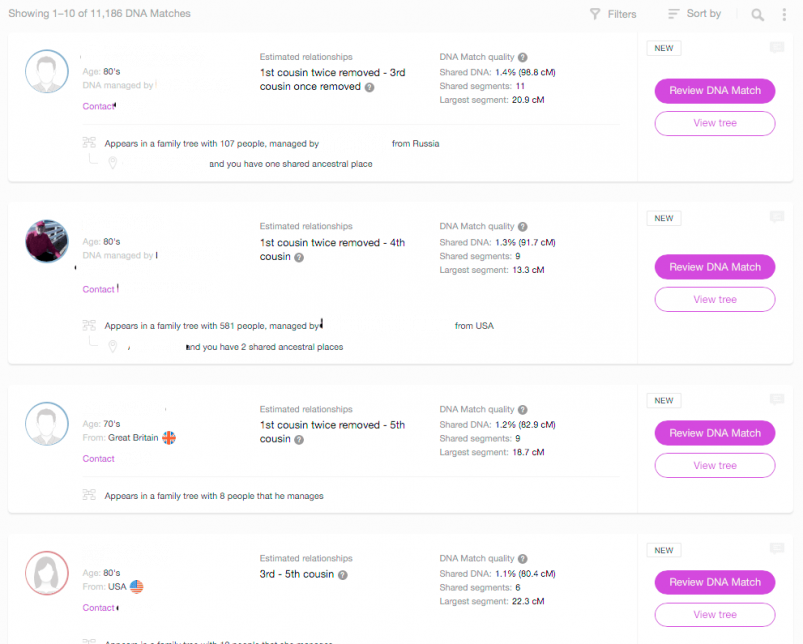
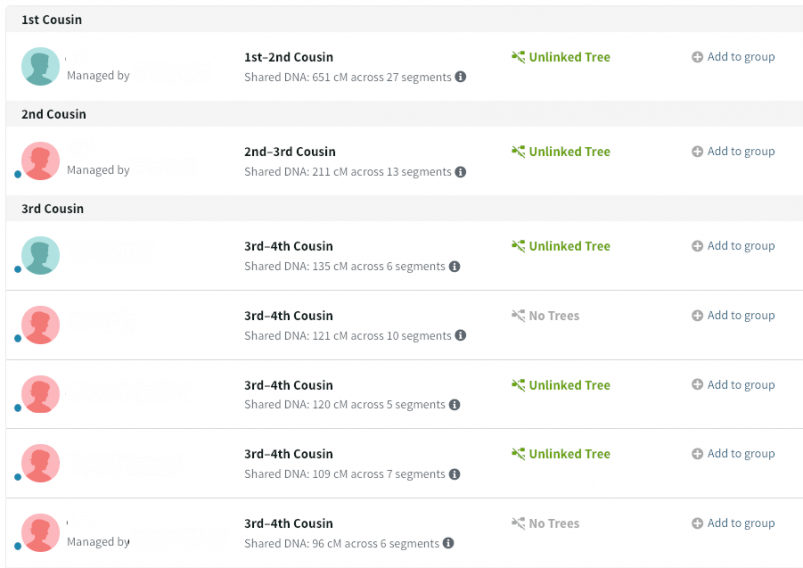
Anyways, on either company’s list, you’ll find each likely relative’s name, how you appear to be related, what percentage of DNA you have in common, and how many DNA segments you share.
If you click on a relative’s name, you can get more information about them, including shared family surnames. You can also attempt to contact them through the company. And if you subscribe to the company’s genealogy service, you can easily add them to your family tree.
- Family Tree. Even if you don’t subscribe to MyHeritage or AncestryDNA’s genealogy services, buying one of their test kits entitles you to build a small family tree online – by manually adding all the relatives you know about. My family trees are below.
AncestryDNA (again, with the gloomy color scheme):
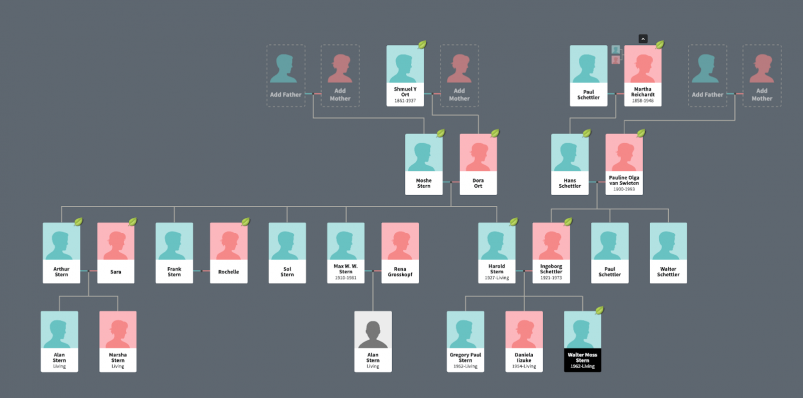
MyHeritage DNA:
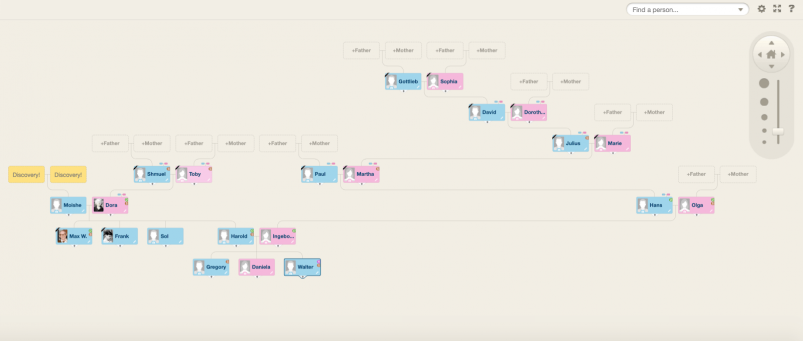
As you can see, they’re not very big…because I’m not a subscriber. If I were, they’d be much larger and more detailed.
Both companies (especially MyHeritage) frequently dangle relative matches that they’ve found for me in front of my face. If I would only subscribe, I could add these relatives to my tree. Alas.
Features Unique to MyHeritage DNA
- Chromosome Browser. This feature lets you choose one or more specific relatives from among your DNA matches and see exactly which DNA segments you have in common on each of your chromosomes.
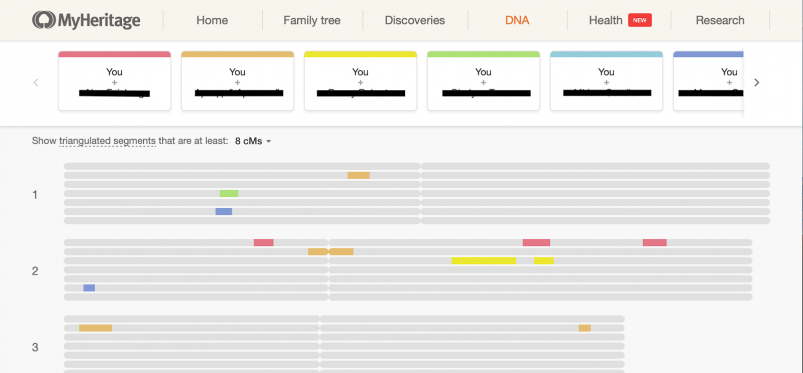
They’re color coded so you can see which segments you share with whom. I guess this is kind of interesting, but it’s not very meaningful to me as a non-geneticist, and I could just as easily live without it. (Although, from reading the reviews, I know some people find this feature super interesting – to each their own!)
- DNA Match Overview. This is a nice touch. In addition to giving you a huge list of people who seem to be related to you based on shared DNA, MyHeritage DNA offers you a high-level snapshot that categorizes these matches as either close family, extended family, or distant relatives. Here’s mine.
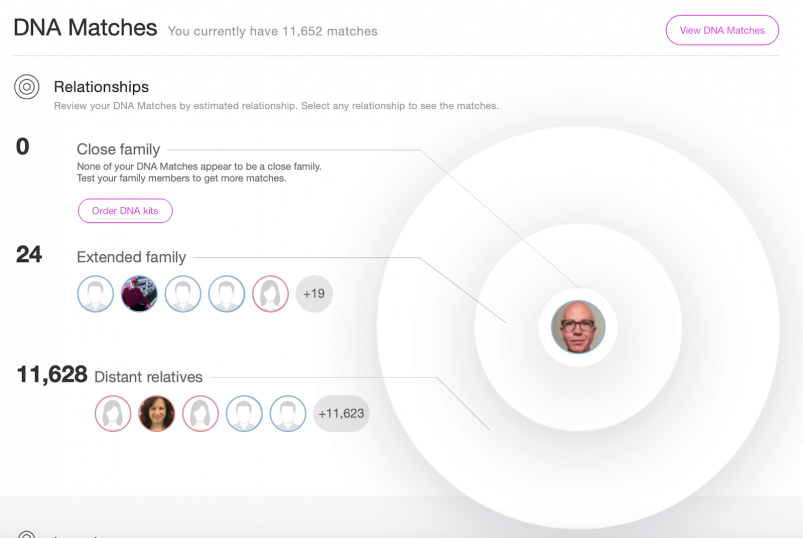
- Auto Clusters. If you’re a MyHeritage subscriber, this feature will show you how you and your DNA matches are descended from common ancestors. Since I’m not a subscriber, here’s an example from their website.
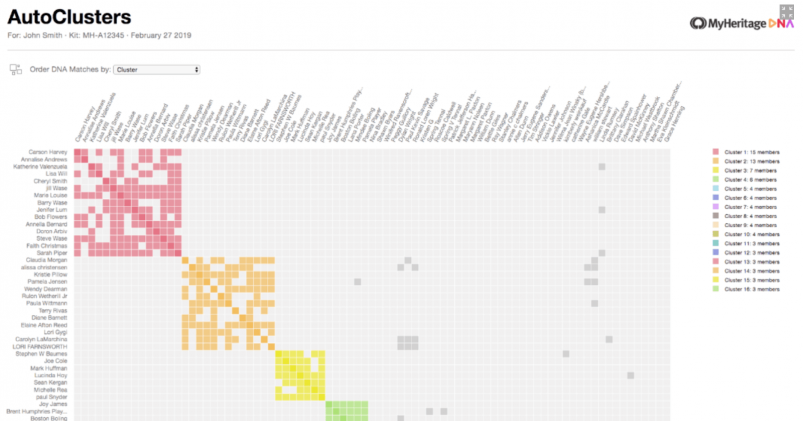
- Ethnicities Around the World. This interactive map shows you which ethnicities are most common in any given part of the world. (And, by the way, anyone can use this feature – even if you haven’t taken a test or subscribed.)
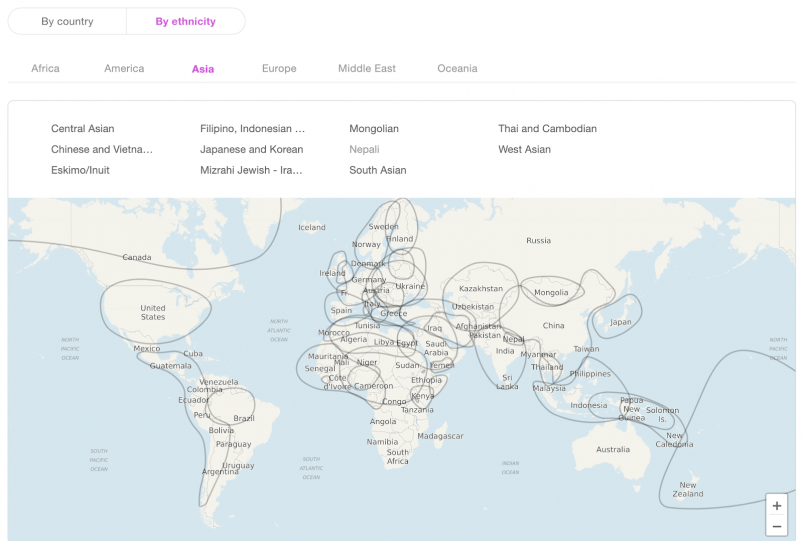
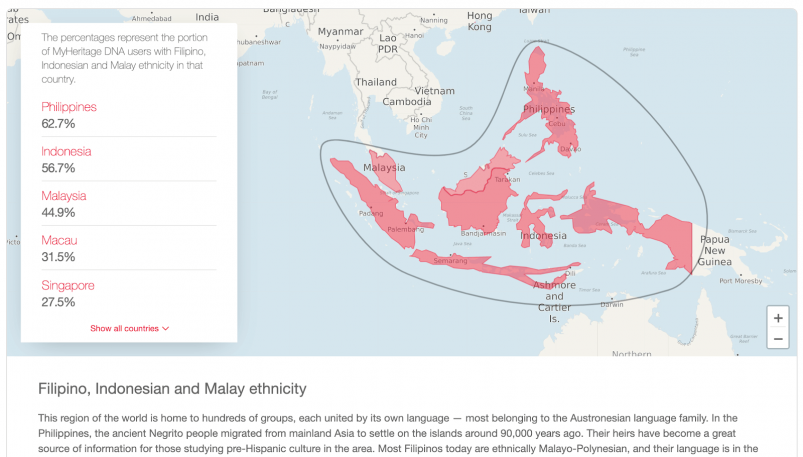
This feature is interesting to explore, in my opinion. I think we usually tend to think of other countries as being pretty homogenous, especially if they’re countries we have no personal connection to. But, in reality, every country is a melting pot in its own way, as this feature reveals.
Buy Your MyHeritage DNA Kit Today
Features Unique to AncestryDNA
- ThruLines. This is a similar idea to MyHeritage DNA’s AutoClusters. It shows you which ancestors you may have in common with your DNA matches. Here’s the example from AncestryDNA’s website:
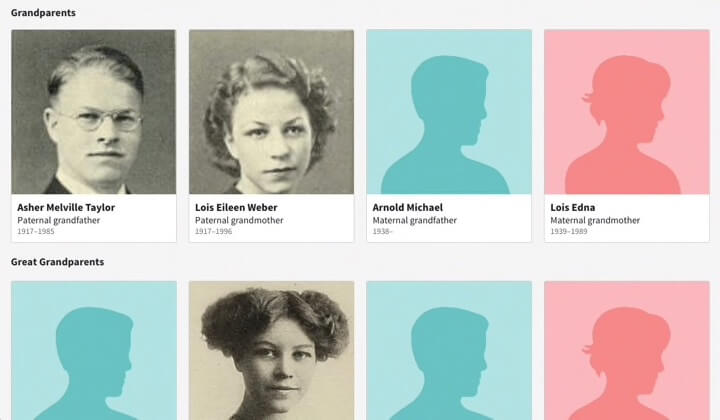
And here’s mine. It’s not as colorful. I guess AncestryDNA doesn’t have photos for any of them (or I need to have a subscription).
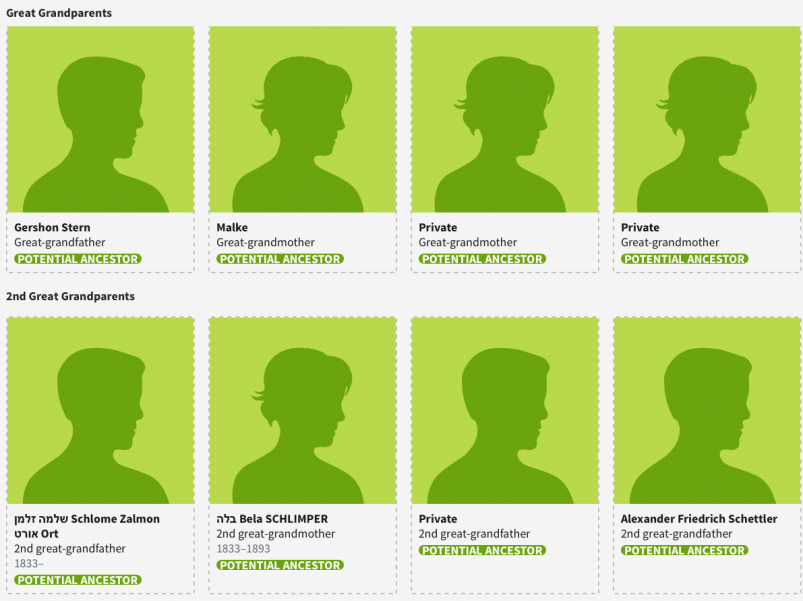
Most of these potential ancestors (based on my DNA) are ones that I don’t share with any other people in AncestryDNA’s DNA database. But here’s an exception (unredacted because they’re deceased):
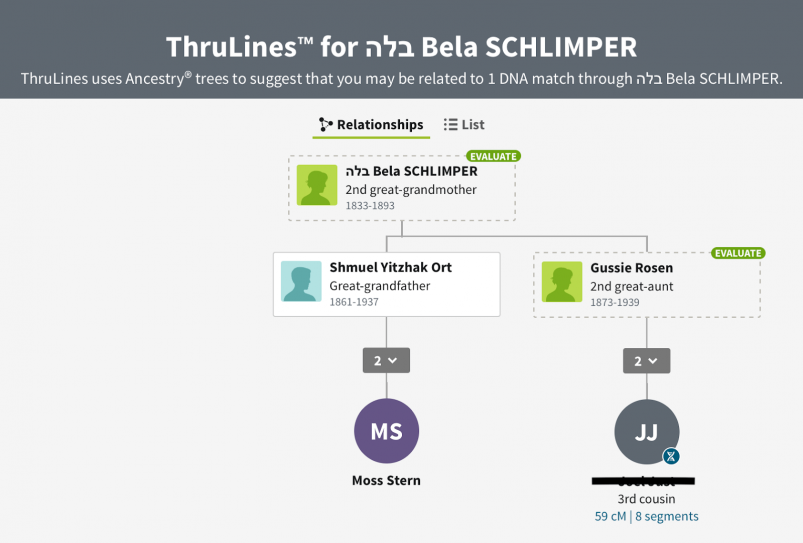
If you’re like me, and have trouble visualizing how you’re related to distant family members, this is a pretty useful feature. Okay, I’ve walked you through how these two companies’ reports compare. But how accurate are these reports? How satisfying are they overall?
Buy Your Ancestry DNA Kit Today
How Accurate are the DNA Test Kits?
In identifying ancestral origins, MyHeritage DNA categorizes the world into 42 regions, while AncestryDNA uses over 500. Although the reason for this discrepancy is unclear, it suggests that AncestryDNA’s larger number of regions could lead to more geographically accurate reports.
In my case, AncestryDNA was able to identify some Southeast Asian ancestry that MyHeritage DNA didn’t detect at all. I’m pretty sure one of my ancestors was Javanese, and both AncestryDNA and 23andMe picked up on this. (Want to learn more about 23andMe? Read my in-depth review here.)
Did MyHeritage DNA miss that because of the limited number of regions it considers? Maybe. All I know is that I found my ethnicities estimate from MyHeritage DNA a bit lacking.
I must point out that millions of customers have used both MyHeritage DNA and AncestryDNA. For each company, a certain percentage of customers feel their results are inaccurate, whereas most are satisfied with the accuracy of their results. So my own experience is by no means representative.
Database Size
It’s clear that AncestryDNA and MyHeritage DNA have extensive databases. AncestryDNA has more than 22 million DNA samples from customers, while MyHeritage has over 6 million. You can also access historical records through both companies, with AncestryDNA providing more than 20 billion birth, marriage, and death certificates, census data, and military records. Meanwhile, MyHeritage has over 19 billion historical documents.
MyHeritage states that they have about 104 million subscribers and more than ten billion historical records. This is compared to AncestryDNA’s three million subscribers and 20 billion records. So, DNA matches aside, both can offer you a lot when it comes to your family history.
I’d bet you’d be really happy with the family tree suggestions you’d get from either company. But I haven’t subscribed to either of their genealogy services, so I can’t tell you how they compare from a personal standpoint on this variable.
Geographical Coverage
Geographical coverage in DNA tests helps identify the regions your ancestors came from, which adds depth to your understanding of your heritage. DNA will give you a breakdown of your ancestors’ ethnicities. They’ll tell you where those ancestors lived, and what percentage of your heredity each ethnicity represents. When it comes to ethnicity estimates, MyHeritage offers a larger number of geographic regions at over 2,100, compared to AncestryDNA’s 1,800.
This extra coverage may offer a more detailed picture of your ethnicity, potentially identifying more specific areas where your ancestors lived. However, it’s important to note that the accuracy of these estimates depends not just on the number of regions but also on the size and diversity of the DNA database each service has. AncestryDNA, with its larger database, might offer more accurate connections despite having fewer regions. So, while MyHeritage covers more regions, AncestryDNA’s larger database could compensate for its slightly narrower geographical scope.
Privacy Measures
When it comes to DNA testing services like MyHeritage and AncestryDNA, privacy is a significant concern. Users are essentially handing over sensitive genetic information, and how that data is managed is crucial.
AncestryDNA has a privacy policy that specifies that your data will not be shared with third parties without explicit consent. They also offer users the choice to participate in research studies, which would involve sharing anonymized data with researchers. You have the option to delete your DNA data and terminate your account if you wish. However, if your data has been used in studies, it can’t be withdrawn from those studies retrospectively.
MyHeritage also takes privacy seriously, explicitly stating that it will never sell or license DNA data to insurance companies, employers, or any third party without explicit user consent. Unique to MyHeritage is their additional two-factor authentication to enhance account security. They also allow users to download and delete their DNA data at any time. Additionally, MyHeritage uses encrypted connections and data encryption to further protect user information. However, it’s important to know that MyHeritage will release your DNA information at the request of law enforcement. It’s also good to note that the built-in chat on the platform is not very secure.
Both companies adhere to privacy laws and guidelines, such as the General Data Protection Regulation (GDPR) in Europe. However, MyHeritage seems to take a slight edge in terms of added security measures like two-factor authentication.
Raw data download and upload
AncestryDNA allows users to download their raw DNA data, which is useful if you want to use that data with other services for additional analysis.
MyHeritage offers the same download feature but goes a step further by allowing users to upload raw DNA data from other services. This upload capability makes MyHeritage a more flexible option for those interested in analyzing their data across multiple platforms. Both services thus offer raw data downloads, but MyHeritage has the added advantage of supporting data uploads from other testing services.
Community and Additional Features
While the ancestry reports you receive from AncestryDNA and MyHeritage share many common elements, they have their differences.
AncestryDNA offers a feature called ThruLines, which traces your ancestry back to a number of specific forebears. This feature shows how you’re related to your DNA matches (i.e., through which specific family line).
MyHeritage DNA has some unique tools such as their Chromosome Browser, AutoClusters, and Ethnicities Map, as well as a pictorial overview of your DNA matches, which I’ll walk you through in the next section. To me, MyHeritage DNA’s report feels a little more substantial.
Customer Support
Most of the time, commercial DNA testing goes smoothly. But when it doesn’t, how hard is it to resolve the issue? And if you have questions, how hard is it to get answers?
FAQ Pages
Both MyHeritage DNA and AncestryDNA have support pages that try to answer the questions customers ask most frequently.

For whatever it’s worth, the MyHeritage DNA Help Center seems to contain a lot more FAQs than the AncestryDNA Help Center. That may (or may not) mean you’re more likely to find answers to your questions.
Support Request Forms, Live Chats, and Phone Support
Most DNA testing companies have a form you can fill out on their website to request support via email. When I took my DNA tests from MyHeritage DNA and AncestryDNA two months ago, both offered this support option.
But now, it looks like MyHeritage DNA no longer has an email support request form. Their only personal support channel is via phone. My hunch is, they discontinued their email support because it was deeply broken. I still haven’t received an answer to a question I submitted two months ago.
On the plus side, MyHeritage DNA offers 24/7 phone support, at least in English-speaking countries (including the US, UK, Canada, Australia, etc.).
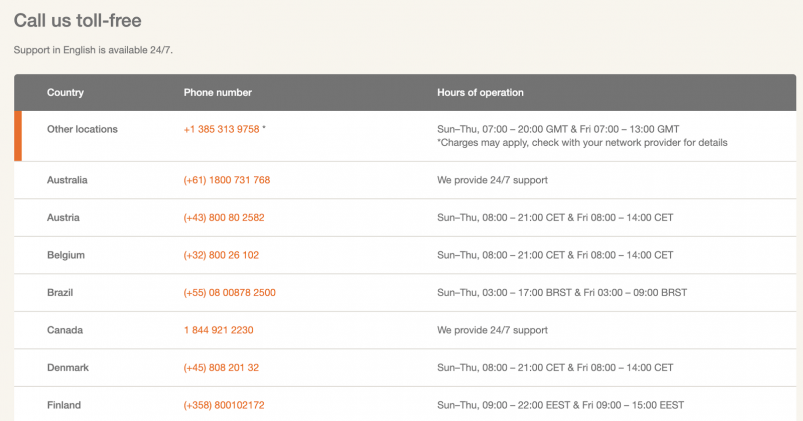
AncestryDNA, on the other hand, offers support via live chat, email, and telephone. Although, the service hours are not clear.

My Personal Experience
I didn’t have any problems with my DNA tests, so I don’t know how well MyHeritage or AncestryDNA would have responded if I had. But I did ask them both questions about their services, via phone and email (back when MyHeritage still offered email support).
- In both cases, my phone support went very smoothly. The wait was short, the customer service representatives were friendly and knowledgeable, and I was satisfied with the answers I received.
- The same was true for my email response from AncestryDNA. MyHeritage, as I said, never responded (it’s probably for the best they no longer offer this service).
Have Others Experienced Any Issues?
From my research, I’ve seen a lot of complaints involving MyHeritage’s free one-month genealogy trial subscription. These customers said their free trial got converted into a full one-year subscription without any notification or their consent. They were just suddenly charged for it. When they tried to get their money back, they failed. That’s pretty appalling, and something to watch out for.
For AncestryDNA, customer complaints are a bit more varied.
- Some had a similar issue with a free trial that got converted to a paid subscription without consent.
- Some complained that their DNA results were blatantly inaccurate for various reasons.
- Some customers never got their results – and couldn’t even get a refund!
No company is perfect, and you can find customer complaints about pretty much any product or service. That being said, based on my experience, I believe most MyHeritage DNA and AncestryDNA customers probably don’t run into any problems (I certainly didn’t).
But when problems do occur, both companies have had some well-documented trouble giving their customers satisfaction. It doesn’t seem that either company is better than the other in this respect.
Pricing
If you’re on the fence about which ancestry test you’d like to buy. Consider this: Purely from a cost standpoint, MyHeritage DNA is a much better deal than AncestryDNA. While both companies occasionally discount the price of their test kits, the price of a MyHeritage DNA kit usually hovers around 40% less than the cost of an AncestryDNA test kit. If you factor in the cost of a genealogy subscription, there’s an even greater price difference.
If you include a discount, each MyHeritage tier is about a third of the price of each AncestryDNA tier! Now, all this assumes that you’re getting the exact same thing from each subscription. That’s clearly not the case.
In terms of access to information, it’s hard to figure out exactly what features come with each tier of a MyHeritage subscription. AncestryDNA is a lot more transparent. It’s possible that AncestryDNA gives you so much value with its subscription features that it’s totally worth the higher cost. Personally, I couldn’t tell you.
What I can tell you is how I feel about just the ancestry tests by themselves. In my opinion, MyHeritage DNA gave me a few more cool features than AncestryDNA, plus it costs a lot less.
| Service/Feature | MyHeritage Pricing | AncestryDNA Pricing |
|---|---|---|
| Basic DNA Test | $89 | $99 |
| Advanced DNA Test | No advanced test available | Two options: $476 (with Traits and World explorer membership) |
| Shipping Fees | Depends on local postal rates | $9.95 for the first kit; $4.95 for each additional kit |
| Monthly Subscription | Not available (only annual subscription) | Starts at $24.99 |
| Annual Subscription | Starts at $79 per year | Starts at $21.99 per month |
| Additional Features | Free trial (14 days) | Free trial (14 days) |
| Data Upload Fee | Free | Not available |
| Data Download Fee | Free | Free |
Bottom Line
When it comes to getting an ancestry report, are you still wondering whether to go with MyHeritage DNA or AncestryDNA? I know, it’s a tough choice.
- Both have a very similar benefit: the powerful combination of a DNA ancestry test and a world-class genealogy service.
- Both have huge numbers of DNA and genealogy customers, as well as enormous troves of family heritage data. Either option can help you learn a lot about your ancestry and build your family tree.
- Both have very similar ancestry reports, though MyHeritage DNA has a few more features.
- MyHeritage DNA is less expensive, both in the cost of its DNA test and the price of its monthly genealogy subscription. So it’s definitely the better deal.
- AncestryDNA has a larger DNA customer database, which may mean that they can connect you with more relatives based on your shared DNA. (That said, MyHeritage DNA found more than 11,000 potential relatives for me…and I think that’s plenty!)
So if you’re looking for an ancestry report combined with a powerful genealogy service, you should do just fine with either company. The choice is yours!
FAQ
Which vendor is less expensive: MyHeritage or AncestryDNA?
MyHeritage’s DNA tests are usually less expensive (starting price: $89) in their list price than AncestryDNA’s tests (starting price: $99), and are more likely to be on sale at any given time.
Who should choose MyHeritage over AncestryDNA?
MyHeritage offers you basic information about your ancestry at a lower cost than AncestryDNA. MyHeritage’s genealogy subscriptions are also considerably less expensive. Therefore, MyHeritage is a better choice when cost is a key consideration. If you want to learn more about the best Ancestry DNA tests, click here.
Who should chose AncestryDNA over MyHeritage?
AncestryDNA’s ancestry reports are more detailed and accurate than MyHeritage’s ancestry reports. And AncestryDNA also has the largest DNA database as well as the largest database of historical records in the world, which should allow you to find more relatives and discover more about your family’s past. If cost is no object, you’re more likely to be happy with the ancestry information you get from AncestryDNA.

